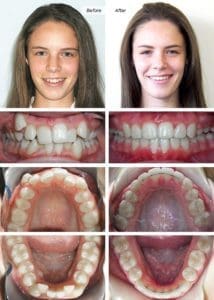Orthodontic treatment is vital to ensuring proper alignment and development of the teeth, jaw, and facial structures. It is often believed that orthodontic treatment should only begin when a child reaches their teenage years. But experts suggest that early orthodontic intervention can greatly benefit children by achieving optimal oral health and a beautiful smile. Parker Orthodontics offers advanced early orthodontic treatment, aiming to address various dental issues and provide comprehensive care for children.
The American Association of Orthodontists (AAO) suggests that children should have their first check-up with an orthodontist at 7 years old. But don’t worry, this doesn’t mean all seven-year-olds will need braces. At this age, kids’ baby teeth are starting to fall out and their adult teeth are growing in. It’s also a good time to see how their jaws are growing. If we keep an eye on your child’s teeth and jaw growth with regular check-ups with Dr. Parker, we’ll be able to figure out the best time to start any treatment if it’s needed. Request a consultation with Dr. Parker to get started.
Early treatment in orthodontics refers to the intervention and correction of dental and jaw misalignments at a young age. This proactive approach aims to address issues such as overcrowding, protruding teeth, and jaw discrepancies in children and adolescents.
By identifying and treating these problems early on, orthodontists can prevent them from worsening or causing further complications in the future. Early treatment in orthodontics often involves the use of braces, aligners, or other dental appliances to guide the growth and development of the teeth and jaw. It can lead to improved oral health, enhanced facial aesthetics, and a reduced need for extensive orthodontic treatment in later years.
It allows orthodontists to identify and address any potential issues with the alignment and positioning of a child’s teeth and jaws at an early stage. By starting treatment early, orthodontists can guide the growth and development of the teeth and jaws in a more favorable direction, preventing the need for more invasive and extensive treatments later on.
Early orthodontic treatment can help improve the child’s oral health, as misaligned teeth are often more difficult to clean and can increase the risk of tooth decay and gum disease. It can also have psychological benefits, as addressing any aesthetic concerns with a child’s smile early on can help boost their self-esteem and confidence.
The best time for braces (teeth straightening treatment) is just before your child loses their last set of baby back teeth. This can change for different kids, but it’s usually when they’re between 12 and 14 years old.
Stage 1: Early treatment (2-6 years old)
 Early teeth straightening treatment is about helping both sets of teeth grow the right way. The main goal here is to make sure there’s enough room for the adult teeth to grow in correctly.
Early teeth straightening treatment is about helping both sets of teeth grow the right way. The main goal here is to make sure there’s enough room for the adult teeth to grow in correctly.
Children who might need early treatment could be ones who have trouble biting properly, who lose their baby teeth too soon, who have jaws that click or grind when they move, who grind their teeth (bruxers), and children who breathe through their mouths instead of their noses and mouths.
During this early treatment stage, your child’s dentist will work with you and your child to stop habits that could harm their teeth, like using a pacifier too much or sucking their thumb. The dentist might also give your child a special dental device to help their jaw grow, keep a space open for adult teeth (space maintainers), or stop the teeth from moving into the wrong places.
Stage 2: Middle teeth stage (6-12 years old)
The goals for treatments in the middle teeth stage are to fix crooked jaws, start fixing crossbites, and begin to slowly straighten out adult teeth that are not lined up right. During the middle teeth stage, the hard and soft parts of the mouth are very flexible. So, in some ways, it’s a really good time to start fixing a bad bite.
Your dentist might give your child a dental device during this stage. Some devices (like braces) are stuck on, and others can be taken out. No matter what kind of device it is, your child will still be able to talk, eat, and chew normally. But, if your child has a dental device that can’t be removed, they should make sure to clean their entire mouth really well every day. This can help lower the risk of staining, decay, and other damage to how their teeth look later on.
Stage 3: Teenage teeth stage (13+ years old)
When most parents think of teeth straightening treatments, they’re probably thinking about the teenage teeth stage. Some of the main goals during this stage include getting the adult teeth to line up right and making the smile look better. During this stage, the dentist will usually give the teenager “braces” that are either stuck on or can be taken out to slowly straighten the teeth.
After the braces are taken off, the teenager might need to wear a retainer. This is to stop the teeth from moving back to how they were before the treatment.
Are you a parent who is wondering if your child needs orthodontic treatment? Orthodontic treatment is not just for teenagers with crooked teeth. In fact, there are several conditions that may require early orthodontic treatment. Here are some of the common conditions that may warrant early orthodontic intervention.
1. Crossbite
A crossbite occurs when the upper teeth bite inside the lower teeth. This can lead to jaw misalignment, difficulty chewing, and uneven wear of the teeth. Early orthodontic treatment can correct crossbites and prevent further complications.
2. Overbite
 An overbite occurs when the upper front teeth significantly overlap the lower front teeth. In severe cases, it can cause the lower teeth to bite into the roof of the mouth, leading to speech problems and potential damage to the gums. Early orthodontic intervention can correct an overbite and help improve oral function and aesthetics.
An overbite occurs when the upper front teeth significantly overlap the lower front teeth. In severe cases, it can cause the lower teeth to bite into the roof of the mouth, leading to speech problems and potential damage to the gums. Early orthodontic intervention can correct an overbite and help improve oral function and aesthetics.
3. Underbite
An underbite is the opposite of an overbite. It occurs when the lower front teeth overlap the upper front teeth. Severe underbites can cause jaw misalignment, difficulty chewing, and facial asymmetry. Early orthodontic treatment can help correct an underbite and prevent future complications.
4. Crowding
Crowding is a common condition where there is not enough space in the mouth for all the teeth to properly align. This can lead to crooked teeth, difficulty cleaning, and an increased risk of tooth decay and gum disease. Early orthodontic treatment can create enough space for all the teeth to erupt properly, avoiding future dental problems.
5. Open Bite
An open bite is when the upper and lower front teeth do not touch when the back teeth are together. This condition can affect speech, swallowing, and proper chewing. Early orthodontic intervention can help correct an open bite and improve overall oral function.
6. Thumb Sucking and Pacifier Use
Prolonged thumb sucking or pacifier use can cause dental issues such as protruding front teeth, an open bite, and misaligned jaws. Orthodontic treatment may be necessary to address these problems and prevent further damage.
Early orthodontic treatment, often referred to as interceptive orthodontics, can begin as early as 6-7 years old. Orthodontists can identify potential issues and create a treatment plan to address them before they worsen. By starting treatment early, the duration and complexity of future orthodontic treatment can be reduced. If you notice any of these conditions in your child, it is recommended that you consult with an orthodontist for an evaluation. They will assess your child’s dental and jaw development and determine if early orthodontic treatment is necessary.
Early orthodontic treatment can correct a wide range of dental issues and prevent further complications. If you suspect that your child may need orthodontic treatment, it is best to consult with a professional orthodontist who can provide a comprehensive evaluation and guide you through the treatment process. Remember, addressing these conditions early can lead to better oral health and a beautiful smile for your child in the long run.
Two-phase orthodontic treatment for children is an approach that involves two stages of orthodontic treatment.
With our expert team and state-of-the-art facilities, we are dedicated to providing high-quality orthodontic care to enhance your oral health and transform your smile.
We also cater to teens and adults dental needs, such as:
We prioritize patient satisfaction and strive to provide exceptional care in a comfortable and friendly environment. Dr. Parker stays up-to-date with the latest advancements in orthodontic techniques and technologies to ensure the best possible outcomes for our patients. If you’re looking for reliable orthodontic services backed by expertise and personalized care, contact us today or call our locations below.